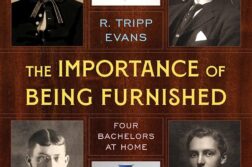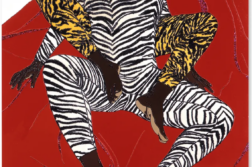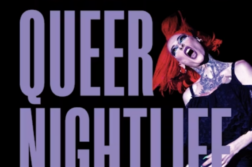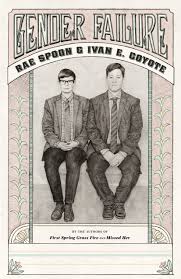 Gender Failure
Gender Failure
by Rae Spoon and Ivan E. Coyote
Arsenal Pulp Press. 160 pages, $17.95
Ivan E. Coyote and Rae Spoon are two Canadian performance artists, both born female, who identify themselves, respectively, as a butch storyteller and a trans musician. In 2007, they collaborated on their first show, You Are Here, which combined music and stories with a background of projected visuals. After five years of touring, they developed a more autobiographical collaborative show, Gender Failure, and performed it on stages throughout Canada, the U.S., and Britain. I was lucky enough to see it in person. The advantage of the book, which includes photographs and illustrations, is that it can be savored at leisure. The authors flesh out the concept of “gender failure” by telling stories about their personal journeys in a culture that sees male and female as mutually exclusive states. In a pastiche of anecdotes, some poignant and some darkly funny, they show that gender is instead a spectrum or a kaleidoscope; it is society that fails to account for human diversity. Each author provides an introduction, and the rest of the book is divided into alternating chapters about their lives. There’s a lot of wry humor in their accounts of puberty, adolescence, and early adulthood. Spoon’s childhood in a rigidly religious family in Alberta seems almost too extreme to satirize. Although he was able to escape his family’s expectation that he would grow up to be a good Pentecostal woman, he could not escape the influence of country music on his early career as a singer–songwriter. Appearing in public as a masculine-looking performer on the country music circuit is described as an exercise in cultural confusion. Coyote’s stories include his decision to write a letter to all his relatives explaining his motives for having his large, healthy breasts removed, and their ultimate acceptance of this decision.
Jean Roberta
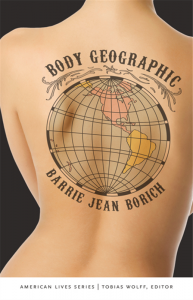 Body Geographic
Body Geographic
by Barrie Jean Borich
Nebraska. 248 pages, $17.95
“Maps obscure more than they reveal because their flatness is contrary to the layered experience of living. Maps are representational, but life is lived in the body, is dimensional, has voice and history.” Body Geographic is Barrie Jean Borich’s experiment in mapping her life on the landscapes in which she has lived and traveled, especially in the American Midwest. The grandchild of Croatian immigrants, raised on the South Side of Chicago, Borich explores how her past infuses her present life. She teaches creative writing at DePaul in Chicago, having returned after nearly two decades in Minneapolis. As a scholar, she writes about “creative nonfiction,” a hybridized form of memoir, essay, and autobiography. There’s much wisdom in the book, much to learn about form, language, and ideas. It is innovative without being clever, elegant without being overwrought. In this era of same-sex marriage, the twenty-plus-year relationship between Borich and her “lesbian husband” Linnea is portrayed with poignant intimacy that is somehow private, revealing, and graphic. The chapter on Linnea’s brain surgery, especially, exemplifies the credo of “in sickness and in health.” Borich believes that “all cities are really double cities: the city itself and another city, the city of possibility, a projection of the real, the manifestation, part practical, part erotic, of what we wish for in our lives.” Hers is a story one can get lost in, which might tell us all we need to know about maps and personal geography.
Chris Freeman
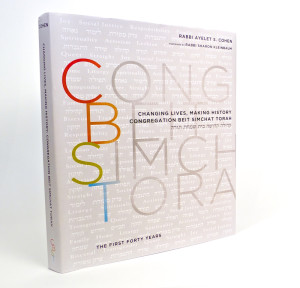 Changing Lives, Making History:
Changing Lives, Making History:
Congregation Beit Simchat Torah
by Ayelet S. Cohen
Cong. Beit Simchat Torah. 320 pages, $50.
This profusely illustrated history of the world’s second gay synagogue, which was established in New York City in 1973 (the first was in L.A.), is a thoroughly enjoyable read. Ayelet Cohen, who served in the early 2000’s as a rabbi at the West Side’s Congregation Beit Simchat Torah, has pulled together a trove of information: archives, photographs, and interviews with members, rabbis, and rabbinical interns. The CBST began with a small ad in The Village Voice under the headline “Gay Synagogue,” which drew ten or fifteen men and a few women. Within two years the group had outgrown its home in Holy Apostles’ annex. Gender disparity was always a problem, but it was alleviated in 1992, once the first female rabbi (openly lesbian Sharon Kleinbaum) was hired. The focus of a semi-scholarly work in 1995, Moshe Shokeid’s A Gay Synagogue in New York, Changing Lives can serve as a model for any institution faced with the challenging task of writing its history.
Martha E. Stone
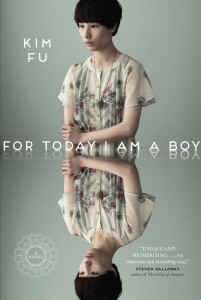 For Today I Am a Boy
For Today I Am a Boy
by Kim Fu
Houghton Mifflin Harcourt. 242 pages, $23.
Told from the point of view of a boy who refuses to accept his maleness—who actually eschews his penis, is disgusted by the thought of sex, and is somewhat befuddled by his lack of masculinity—this novel is beautifully written and appealingly melancholy with a faint sense of etherealness. Fu’s main character, Peter, is growing up in small-town Ontario with his three sisters and his stern Cantonese father, who has high hopes for his only son. Peter is an observant and good-hearted boy, almost to a fault, and his attempts to do the right thing often fall flat. He’s unsure of his own wants and needs, other than the extreme desire to be just like his sisters, even knowing that doing girly things will incur his father’s wrath. As an adult, Peter begins to explore his sexuality, and does so with an eagerness and faux confidence that belie his lingering confusion and regrets about his father’s continuing disappointment. His odyssey from Montreal to California to Berlin brings him in contact with a host of lovers with various fixations (masochism, “ex-gay” pretensions), but eventually he meets a man named John and, with the help of his widely dispersed sisters, seems poised to get his life on track.
Terri Schlichenmeyer
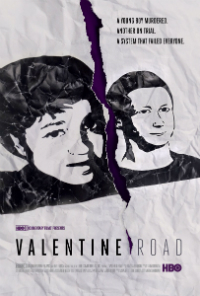 Valentine Road
Valentine Road
Directed by Marta Cunningham
Bullfrog Films
In 2008, Lawrence “Larry” King, age fifteen, was shot twice in the head right in front of his classmates by Brandon McInerney, age fourteen, while in the computer lab of E. O. Green Junior High School in Oxnard, California (an affluent city near L.A.). Larry died two days later, on Valentine’s Day. This HBO documentary is an homage of sorts to Larry and his short life, and it’s also a wake-up call to schools everywhere. The film recounts the murder and its aftermath through interviews with family and friends of both boys, as well as students, teachers, lawyers involved in the trial, and some jury members. The trial was delayed for three years and ended in a mistrial. Later, McInerney plead guilty to second-degree murder and voluntary manslaughter and was sentenced to 21 years. Precocious and having come to terms with his sexuality at an early age, Larry liked to dress up in women’s clothes and wore makeup and high heels to school. He was often teased and ridiculed. He had a crush on Brandon and wasn’t afraid to express his feelings. At one point, while Brandon was playing basketball with his buddies, Larry asked him if he would be his Valentine. Larry was shot the next day. What’s striking is not only the cold-bloodedness of the killing itself but the actions of the faculty and administration before and after it. The faculty seem to have been more interested in managing Larry’s behavior than in teaching tolerance and acceptance of differences. Students were never reprimanded for teasing him. The response following the shooting was one of silent neglect: classes continued as if nothing had happened. Students asked for counseling and never received it. To this day, the school has not memorialized Larry in any way. The DVD for Valentine Road includes an abbreviated version intended for classroom instruction.
Stephen Hemrick



